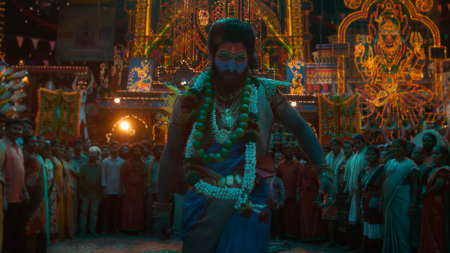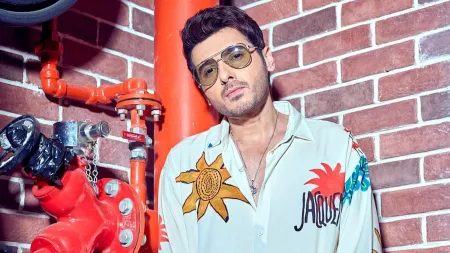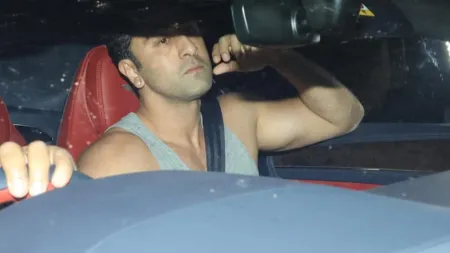Over the years, Bollywood has faced significant criticism for facilitating the launch and success of many nepo babies. Whenever the topic of nepotism arises, Bollywood becomes the go-to punching bag for many, and rightfully so. However, another film industry that often escapes scrutiny in this conversation is Tollywood (Telugu cinema). With the majority of its current stars hailing from film families, Telugu cinema is just as nepotistic, if not more so, than Bollywood. And “Icon Star” Allu Arjun, who celebrates his 42nd birthday today, is no exception.
Hailing from the affluent Allu–Konidela family, Arjun is the son of producer-distributor Allu Aravind and his wife Nirmala. His extended family includes prominent figures such as Telugu megastar Chiranjeevi and his son, actor Ram Charan, actor-producer Nagendra Babu and his children, actors Varun Tej and Niharika, “Power Star” Pawan Kalyan, and actors Sai Dharam Tej and Panja Vaishnav Tej. With the support of one of the largest film families in the industry, it wasn’t difficult for Arjun to make his on-screen debut. In fact, he made his first film appearance at the age of three, playing a small role in his uncle Chiranjeevi’s Vijetha (1985). Much like many other nepo babies in India, his “daddy” himself launched Arjun as a lead hero, at the age of 21, in director K Raghavendra Rao’s Gangotri.

Nevertheless, one thing that sets Arjun apart from the extensive list of Telugu nepo babies is the fact that he recently won the National Film Award for Best Actor for his performance in Sukumar’s Pushpa: The Rise (2021). While debates have been ongoing since then regarding whether the award went to the deserving candidate, Arjun’s victory came as more of a shock than a surprise to the Telugu cinema as male actors from the industry had never previously received such prestigious recognition for their acting prowess, and rightly so, making Arjun the first Telugu male actor to receive the National Film Award. Another significant aspect that left many astonished by his victory was the fact that, prior to Pushpa, Arjun had never starred in a movie that was entirely performance-driven or tapped into his full acting potential. In other words, Pushpa was the first film to truly challenge his skills as an actor, and remarkably, he received a National Award on his first attempt.
In his career since Gangotri, Arjun has often adopted a style akin to Shah Rukh Khan’s, winning hearts with romantic roles that also showcase his comedic and action chops on occasion. In fact, director Sukumar himself played a pivotal role in providing Arjun with a career breakthrough as they joined forces for the first time for Arya (2004), which marked the actor’s sophomore project in the lead role and Sukumar’s directorial debut. A romantic action comedy, Arya helped Arjun etch his name into the hearts of Telugu audiences.
 Allu Arjun and Aditi Agarwal in K Raghavendra Rao’s Gangotri. (Express archive photo)
Allu Arjun and Aditi Agarwal in K Raghavendra Rao’s Gangotri. (Express archive photo)
The actor strategically leveraged the success of Arya and the image he created there, and continued his winning streak with Bunny (2005) and Happy (2006), both falling within the same genre. Meanwhile, Arjun’s career received a significant boost as all three films were dubbed and released in Malayalam, achieving substantial commercial success. This was particularly noteworthy as it occurred during a period when Malayalam cinema lacked romantic comedies and faced a shortage of young talents. Consequently, Arjun swiftly rose to stardom in Kerala as well, becoming a household name almost overnight. A key factor contributing to his popularity in both united Andhra Pradesh and Kerala was his adeptness at intricate dance routines, apart from his comedic timing and the chemistry he shared with his on-screen romantic partners.
Playing characters that resonated strongly with the new generation and urban youth, Arjun continued to achieve success with his subsequent movies — Desamuduru (2007) and Parugu (2008) — both of which were hits in Andhra Pradesh and Kerala. While already riding high on success, Arjun reunited with Sukumar for a spiritual sequel to Arya and emerged with Arya 2 in 2009, which propelled the actor to unparalleled heights. The film solidified Arjun’s status as the “Stylish Star,” effortlessly mastering romance, action, dance and comedy.
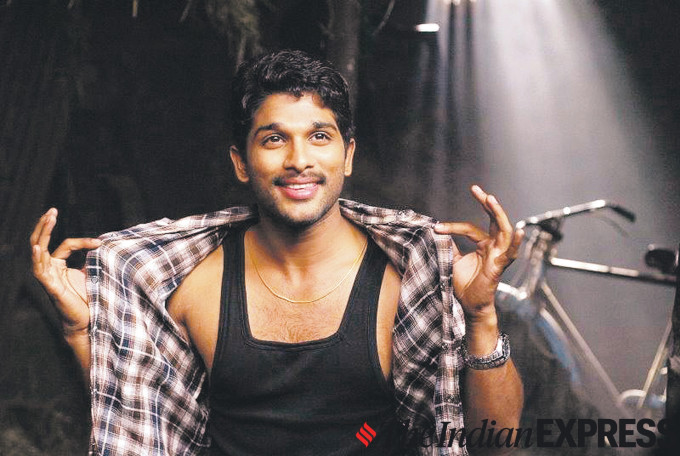 Playing characters that resonated strongly with the new generation and urban youth, Allu Arjun continued to achieve success with his movies. (Express archive photo)
Playing characters that resonated strongly with the new generation and urban youth, Allu Arjun continued to achieve success with his movies. (Express archive photo)
However, seven years into his career, Arjun encountered the long-anticipated disappointment at the box office with Varudu (2010), directed by Gunasekhar, known for giving Mahesh Babu a significant breakthrough with Okkadu — a film that later saw a Tamil remake titled Ghilli, starring “Thalapathy” Vijay, marking a milestone in his career as well. Varudu failed to resonate with Arjun’s “Stylish Star” image and leaned more towards traditionalism, leading even his devoted fans to overlook it.
Nevertheless, Varudu did signal a new phase in Arjun’s career as he briefly attempted to reshape his image, avoiding being pigeonholed into any particular roles. In the same year, he starred in Krish Jagarlamudi’s Vedam. With a storyline and narrative structure that deviated from Telugu cinema’s accepted norms, Vedam, featuring several central characters including of Arjun, became a landmark movie in the mainstream realm. Arjun earned praise for taking on an experimental project, unlike his predecessors and peers.
However, considering the conventional norms in Telugu cinema and the emergence of more young stars (specifically star kids), Arjun quickly reverted to the familiar territory, allowing himself to be stereotyped as the “Stylish Star”, which was a safer choice. Nonetheless, his first attempt, director VV Vinayak’s Badrinath (2011), while commercially successful due to considerable hype surrounding it as Arjun’s return to the mainstream, failed to impress many. Particularly lacking was the actor’s portrayal of his character, an amateur Indian interpretation of a samurai.
Nevertheless, the actor made a majestic comeback the very next year in Trivikram Srinivas’ action comedy Julayi (2012), allowing his fans to heave a sigh of relief and earn a few more as most of his contemporaries in the business were struggling to exhibit swagger and charm alike, qualities that came naturally to Arjun but seemed elusive for others.
View this post on Instagram
A post shared by Madame Tussauds Dubai (@tussaudsdubai)
Following the success of Puri Jagannadh’s Iddarammayilatho (2013), which propelled Arjun back into the spotlight, he shifted his focus entirely to commercial films. In 2014, aside from a cameo appearance in his cousin Ram Charan’s Yevadu, Arjun also starred in the action comedy Race Gurram, which became the highest-grossing Telugu film of the year. Except for Gunasekhar’s Anushka Shetty-starrer Rudhramadevi (2015), where he played the supporting role of Gona Ganna Reddy, Arjun’s subsequent films — S/O Satyamurthy (2015), Sarrainodu (2016), DJ: Duvvada Jagannadham (2017), Naa Peru Surya, Naa Illu India (2018) and Ala Vaikunthapurramuloo (2020) — merely aimed to please his fan base and relied solely on his “Icon Star” image for success, giving the actor no space to showcase his talents as an actor.
However, Sukumar’s Pushpa: The Rise reshaped this perspective and elevated Arjun to the ranks of Telugu cinema’s finest actors, despite its problematic narrative and exaggerated sequences.
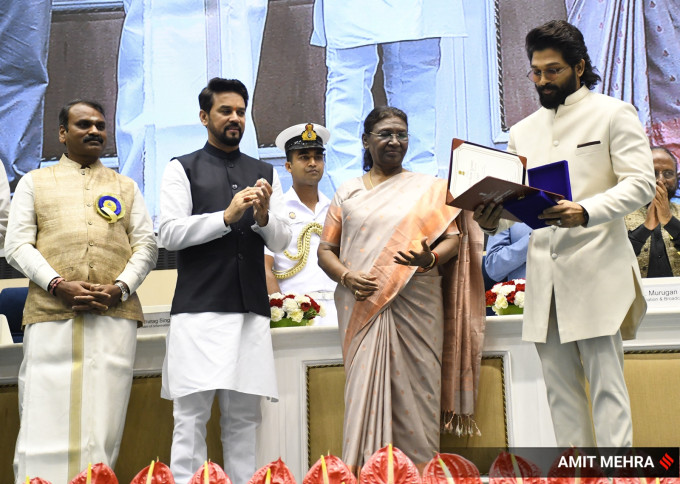 Telugu actor Allu Arjun receives the National Award for Best Actor from President Droupadi Murmu. (Express file photo)
Telugu actor Allu Arjun receives the National Award for Best Actor from President Droupadi Murmu. (Express file photo)
The National Film Awards have seen their fair share of surprises. Over the years, there have been numerous instances where the chosen recipients left people astonished, particularly when there were other names and performances that seemed more deserving of recognition. While debates over certain films or performances being more deserving of wins are common and have arisen many times, the argument that the winner is undeserving has surfaced only a few times, especially in the Best Actor category. However, since the 2000s, such instances have become more frequent, with examples including Anil Kapoor for Pukar (2000), Saif Ali Khan for Hum Tum (2004) and Akshay Kumar for Rustom (2016); and Allu Arjun’s victory being the most recent.
Yet, it’s undeniable that in an industry often centred on celebrating toxic masculinity and presenting male stars in the most stylish manner possible, Arjun’s portrayal of Molleti Pushpa Raj was distinct. Defying conventional norms, Pushpa was unlike any other Telugu hero, and Arjun impeccably portrayed the character, although whether he deserved a National Award for it remains debatable. As the actor gears up for the sequel, Pushpa 2: The Rule, slated to release on August 15, 2024, audiences can only anticipate whether he can recapture the magic and prove himself to be truly deserving of the recognition he has received.
Disclaimer: The copyright of this article belongs to the original author. Reposting this article is solely for the purpose of information dissemination and does not constitute any investment advice. If there is any infringement, please contact us immediately. We will make corrections or deletions as necessary. Thank you.
